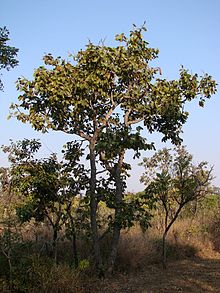Hymenaea
| Hymenaea | |
|---|---|
 |
|
| Hymenaea stigonocarpa | |
| Scientific classification | |
| Kingdom: | Plantae |
| (unranked): | Angiosperms |
| (unranked): | Eudicots |
| (unranked): | Rosids |
| Order: | Fabales |
| Family: | Fabaceae |
| Subfamily: | Detarioideae |
| Genus: |
Hymenaea L. |
| Type species | |
|
Hymenaea courbaril L. |
|
| Species | |
|
see text |
|
| Synonyms | |
|
|
see text
Hymenaea L. is a genus in the flowering plant family Fabaceae (legume family). Of fourteen living species in the genus, all but one are native to the tropics of the Americas, with one additional species (Hymenaea verrucosa) on the east coast of Africa. Some authors place the African species in a separate monotypic genus, Trachylobium. In the neotropics, Hymenaea is distributed through the Caribbean islands, and from southern Mexico to Brazil. Linnaeus named the genus in 1753 in Species Plantarum for Hymenaios, the Greek god of marriage ceremonies. The name is a reference to the paired leaflets.
Most species of Hymenaea are large trees and they are primarily evergreen. They may grow to a height of 25 m (82 ft) and emerge above the forest canopy. Some species will grow both as tall forest trees and as smaller shrubby trees depending on their surrounding habitat. The leaves are pinnately bifoliolate, meaning that they have two leaflets attached to the sides of the petiole. The flowers grow in a panicle or corymb type of inflorescence.
...
Wikipedia
